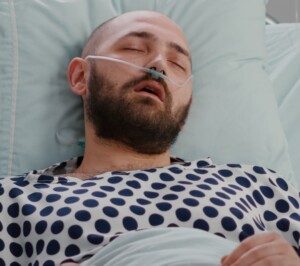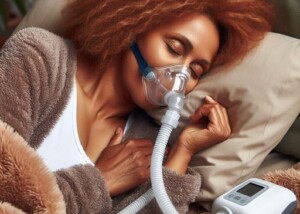
Are you wondering why supplemental oxygen rather than a CPAP machine isn’t enough to treat sleep apnea?
After all, supplemental oxygen would ensure that your blood oxygen levels are at least 90%.
So why would a CPAP machine be necessary?
Many people wonder why the cumbersome CPAP mask and hose system is the gold standard treatment, despite an unimpressive compliance rate, when supplemental oxygen via a simple nasal cannula would be so much more tolerable – while maintaining normal blood oxygen levels throughout the night.
“Even though supplemental oxygen is often used as a stopgap measure to treat sleep, it only acts temporarily by increasing our oxygen reserves,” says Daniel Rifkin, MD, a sleep medicine expert at the Sleep Medicine Centers of Western New York.
“This can prevent our oxygen from falling too low after a prolonged apneic event, but it doesn’t treat or prevent the apnea events themselves.
“Besides oxygen desaturation, apneas are associated with changes in heart rate and other dangerous physiologic events.
“And in some cases, supplemental oxygen can prolong the apnea events because falling oxygen [in the blood] often triggers an arrest of the apnea event.”
Supplemental Oxygen Won’t Stop a Harmful Chain of Events
A study was carried out by Gottlieb et al and reported in the New England Journal of Medicine.
The reason supplemental oxygen isn’t nearly as effective as CPAP is because it does nothing to prevent the airway collapse.
Blood Pressure Increase
CPAP does a wonderful job of normalizing blood pressure during sleep, preventing hypertension.
The Gottlieb study showed that supplemental oxygen did not reduce blood pressure.
However, the oxygen was expected to prevent hypertension because the intermittent periods of oxygen depletion (hypoxemia) trigger sustained rises in blood pressure.
There is no question that the supplemental oxygen’s effect on hypoxemia is quite comparable to that of CPAP.
But the collapsed airway causes big fluctuations in intrathoracic pressure.
Supplemental oxygen does not prevent the harmful changes in intrathoracic pressure that result from night-long breathing against resistance.
Your blood could have all the oxygen in the world from a supplemental device, but without CPAP, you’d still be inhaling against the resistance caused by the soft tissue of your throat caving into your airway.
It’s this breathing against resistance that sets off a chain of events that lead to blood pressure rises and, over time, damage to the cardiovascular system.
In short, do not think that use of supplemental oxygen by itself is sufficient to prevent the dangers of obstructive sleep apnea on the cardiovascular system.










































